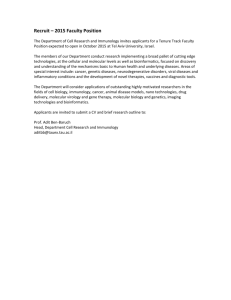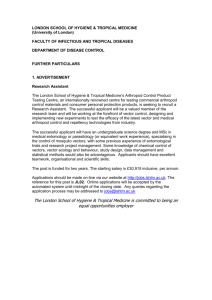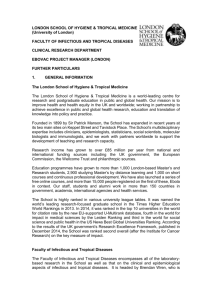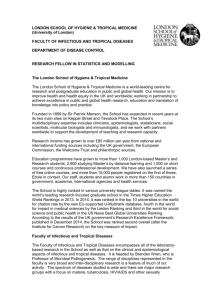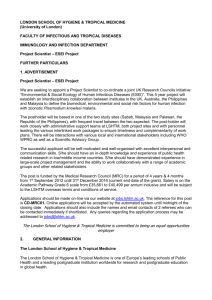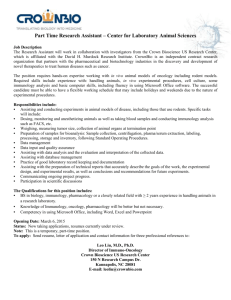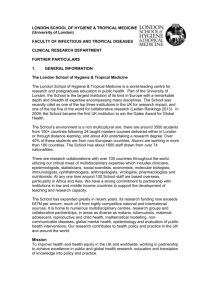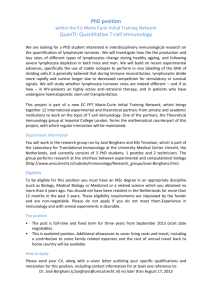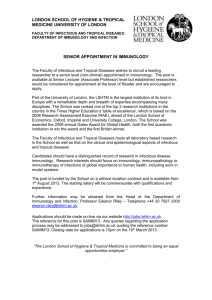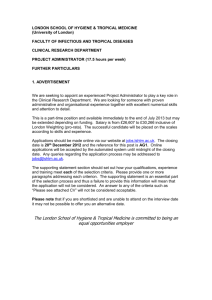Job Description
advertisement
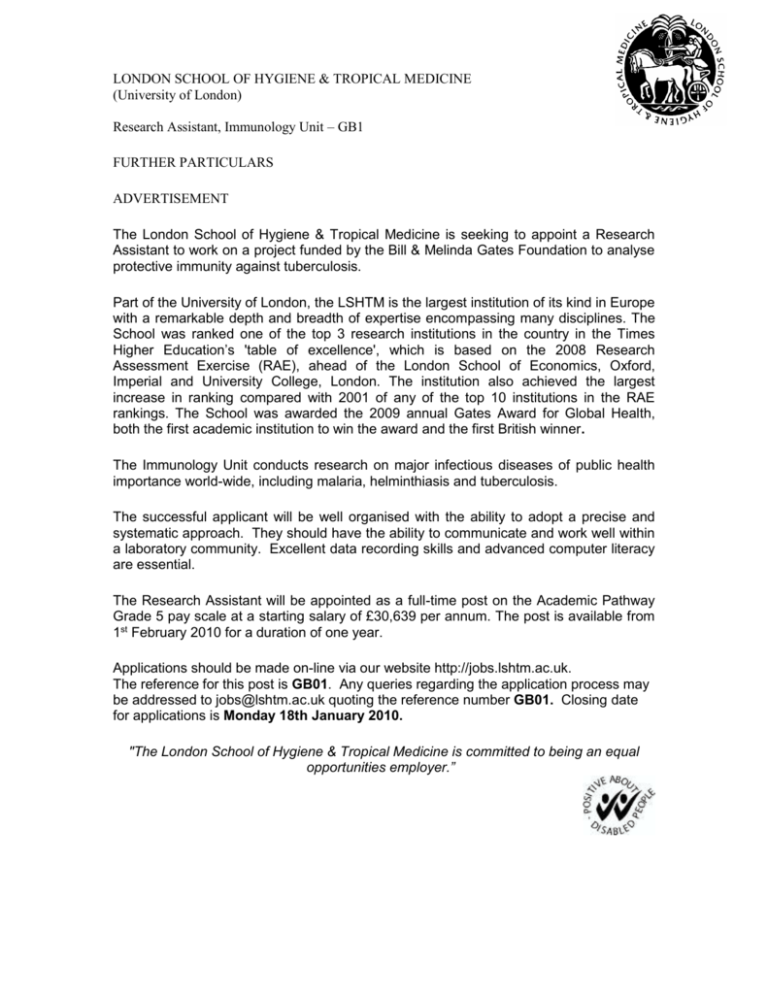
LONDON SCHOOL OF HYGIENE & TROPICAL MEDICINE (University of London) Research Assistant, Immunology Unit – GB1 FURTHER PARTICULARS ADVERTISEMENT The London School of Hygiene & Tropical Medicine is seeking to appoint a Research Assistant to work on a project funded by the Bill & Melinda Gates Foundation to analyse protective immunity against tuberculosis. Part of the University of London, the LSHTM is the largest institution of its kind in Europe with a remarkable depth and breadth of expertise encompassing many disciplines. The School was ranked one of the top 3 research institutions in the country in the Times Higher Education’s 'table of excellence', which is based on the 2008 Research Assessment Exercise (RAE), ahead of the London School of Economics, Oxford, Imperial and University College, London. The institution also achieved the largest increase in ranking compared with 2001 of any of the top 10 institutions in the RAE rankings. The School was awarded the 2009 annual Gates Award for Global Health, both the first academic institution to win the award and the first British winner. The Immunology Unit conducts research on major infectious diseases of public health importance world-wide, including malaria, helminthiasis and tuberculosis. The successful applicant will be well organised with the ability to adopt a precise and systematic approach. They should have the ability to communicate and work well within a laboratory community. Excellent data recording skills and advanced computer literacy are essential. The Research Assistant will be appointed as a full-time post on the Academic Pathway Grade 5 pay scale at a starting salary of £30,639 per annum. The post is available from 1st February 2010 for a duration of one year. Applications should be made on-line via our website http://jobs.lshtm.ac.uk. The reference for this post is GB01. Any queries regarding the application process may be addressed to jobs@lshtm.ac.uk quoting the reference number GB01. Closing date for applications is Monday 18th January 2010. "The London School of Hygiene & Tropical Medicine is committed to being an equal opportunities employer.” LONDON SCHOOL OF HYGIENE & TROPICAL MEDICINE DEPARTMENT OF INFECTIOUS AND TROPICAL DISEASES IMMUNOLOGY UNIT APPOINTMENT FURTHER PARTICULARS The London School of Hygiene & Tropical Medicine The London School of Hygiene & Tropical Medicine is Britain's national school of public health and a leading postgraduate institution worldwide for research and postgraduate education in global health. Part of the University of London, the London School is the largest institution of its kind in Europe with a remarkable depth and breadth of expertise encompassing many disciplines. The School was ranked one of the top 3 research institutions in the country in the Times Higher Education’s 'table of excellence', which is based on the 2008 Research Assessment Exercise (RAE), ahead of the London School of Economics, Oxford, Imperial and University College, London. The institution also achieved the largest increase in ranking compared with 2001 of any of the top 10 institutions in the RAE rankings. The School’s environment is a rich multicultural one: every year over 800 students come to the School from around 120 countries to study doctoral or masters degrees. The School has about 1200 staff drawn from around 45 nationalities. There are research collaborations with over 100 countries throughout the world, utilizing our critical mass of multidisciplinary expertise which includes clinicians, epidemiologists, statisticians, social scientists, molecular biologists and immunologists. At any one time around 80 School staff are based overseas, particularly in Africa and Asia. We have a strong commitment to partnership with institutions in low and middle income countries to support the development of teaching and research capacity. The School has expanded greatly in recent years. Its research funding now exceeds £48 m per annum, much of it from highly competitive national and international sources. The distance learning programme which was launched in 1998 now caters for over 2000 students studying on four masters programmes. The commitment of staff to methodological rigour, innovative thinking and policy relevance will ensure that the School continues to occupy a leadership position in national and global health, adapting quickly to new challenges and opportunities. Mission The School's mission is to contribute to the improvement of health worldwide through the pursuit of excellence in research, postgraduate teaching and advanced training in national and international public health and tropical medicine, and through informing policy and practice in these areas. Department of Infectious and Tropical Diseases The Department of Infectious and Tropical Diseases encompasses all of the laboratorybased research in the School as well as that on the clinical and epidemiological aspects of infectious and tropical diseases. It is headed by Simon Croft, who is Professor of Parasitology. The range of disciplines represented in the department is very broad and inter-disciplinary research is a feature of much of our activity. The spectrum of diseases studied is wide and there are major research groups with a focus on malaria, tuberculosis, HIV/AIDS and other sexually transmitted diseases, vaccine development and evaluation, and vector biology and disease control. The Department is organised into four large research units comprising: Pathogen Molecular Biology, Immunology, Disease Control and Vector Biology, and Clinical Research. There is close interaction between scientists in different research teams. The Department has strong overseas links, which provide a basis for field studies and international collaborations in developed and developing countries. The teaching programme includes MSc courses, taught inhouse and by distance learning, which are modular in structure, a variety of shortcourses and an active doctoral programme (PhD and DrPH). The Immunology Unit (Head: Prof. Eleanor Riley) Research and teaching in the Immunology Unit centres on analysis of the host response to infection at the molecular, cellular and population levels. Our goals are to develop a greater understanding of the basic mechanisms of pathogenesis and immunity and to apply this knowledge to the development of immunological or chemical interventions and the identification of correlates of immune status. Our work involves application of stateof-the-art cellular and molecular approaches to the in vitro analysis of pathogen-host cell interactions, to in vivo studies in animal models and to the study of immunity at the population level in disease endemic areas. The Unit currently comprises 15 academic staff, 14 post doctoral research fellows and 15 research assistants as well as three full-time administrative staff and 6 core-funded technical staff; there are currently 20 full-time PhD students registered within the Unit. Research groups share large, modern, multi-user laboratories and office space on the second and fourth floors of the main Keppel Street Building. The Unit houses an extensive, recently refurbished P3 research facility, a flow cytometry suite, Luminex, ABI Prism 7500 Fast and BiaCore facilities and the Wolfson Centre for Cell Biology. The Wolfson Centre is a self contained imaging suite housing electron and light microscopy, comprising Jeol JEM-1200 EXII Transmission and Jeol-25S III Scanning Electron Microscopes with digital imaging, a Zeiss LSM510 confocal microscope with Eppendorf microinjector, two widefield imaging systems with Volocity software for quantitation and deconvolution analysis and an Arcturus Laser Capture Microdissection instrument (website http://www.lshtm.ac.uk/immu/wcbf/). Our core-funded P2/P3 animal facility is currently being upgraded to permit in vivo imaging at P3 containment. Tuberculosis Research The iTB consortium funded by the Bill & Melinda Gates Foundation Drug Accelerator program investigates novel imaging technologies and genetically tagged reporter bacteria to monitor infection. New antibiotics to treat tuberculosis faster and more effectively are urgently needed. For this endeavour, we combine IVIS and fluorescent molecular tomography (FMT) imaging methods with novel fluorescent/luminescent M. tuberculosis reporter strains. The additional goal is to combine the reporter genes with sensors/promoters which probe aspects of the mycobacterial in vivo environment such as iron status, pH, hypoxia and stresses related to anti-tuberculosis drugs such as isoniazid. Measuring these parameters in real time during infection, using the infectious agent as a probe, will give insight into the pathogen’s response to drug pressure. These innovative techniques will facilitate the development of novel anti-mycobacterial drugs and provide new and important knowledge on the biology of tuberculosis and its treatment. Job Description The successful candidate will work in the Immunology Unit of the Department of Infectious and Tropical Diseases. She/he will be responsible to Dr Gregory Bancroft (the Principal Investigator ), Dr Theresa Ward (Co-Investigator) and to the Head of Immunology Unit (Professor Eleanor Riley). Post: Research Assistant Grade: Academic Pathway Grade 5 Responsible to: Dr Gregory Bancroft, Principal Investigator on the Project, Dr Theresa Ward (Coinvestigator) and the Head of the Immunology Unit (currently Professor Eleanor Riley) Unit: Immunology Start date: 1st February 2010 Duration: One year Hours of work: 35 hours Job Description In vivo imaging of mycobacteria under drug treatment; Maintain and manage in vivo imaging equipment; Maintain Mycobacterium tuberculosis culture, frozen stocks, records of passages and inocula; In vitro trafficking assays of mycobacteria within cultured cells by microscopy; Record all experimental details and results; analyse and prepare confidential reports of results; Observe School and Departmental Safety Guidelines relating to good laboratory practices and the handling of pathogenic materials; Keep up to date with scientific progress, in particular in tuberculosis, myeloid cell and cytokine research, to enable full participation in the project; Attend necessary courses in aseptic techniques, computer skills and handling of radioactive substances, to enable full participation in the project; Assist with teaching of students and visiting workers in the laboratory; Liaise with the postdoc on the project and other members of the group and the unit; Advise Drs. Gregory Bancroft and Theresa Ward on workload and carry out duties and responsibilities as requested. Essential qualifications A first degree (2.1 minimum) or diploma in a relevant subject (immunology, cell biology, or other closely related biological subject) A proven interest in infection-immunology research Experience in tissue culture, confocal microscopy, flow cytometry, cytokine, lipid biochemistry, immunohistology and/or RNA work An excellent and meticulous approach to recording of data, protocols and daily activities Advanced computer literacy Proven ability to manage own workload Proven ability to work as part of a team A flexible approach to working hours Precise and systematic approach Proven communication skills and an ability to develop those skills in a multicultural environment Desirable qualifications, skills and experience: To be a holder of a Personal Home Office License MSc or diploma in biology, biochemistry or immunology. Experience in infection biology of intracellular bacteria. Experience in working with Cat3 microorganisms. Details of Project The project is funded by the Bill & Melinda Gates Foundation to study tuberculosis by in vivo imaging of M. tuberculosis upon drug treatment. SALARY AND CONDITIONS OF APPOINTMENT The appointment is funded by the Bill & Melinda Gates Foundation and will commence on the 1st February 2010 and is available for 1 year. The appointment will be made on the Academic Pathway Grade 5 pay scale at a salary of £30,639 per annum. The post will be subject to the LSHTM terms and conditions of service. Membership of the USS pension scheme is available. The School's retirement date is 30 September following the 65th birthday. It is the School's policy not to appoint candidates aged 65 or over. The person appointed will be entitled to 30 days holiday plus an additional 6 fixed-date Director’s Days. A pension scheme and interest free season ticket loan are available. The School is conveniently situated for public transport (Goodge Street, Russell Square, Euston Square and Tottenham Court Road tube stations nearby). The School has a restaurant, bar and common room. The School has a no smoking policy and an Equal Opportunities Policy. HOW TO APPLY We encourage you to apply for this post online at our website jobs.lshtm.ac.uk. The reference for this post will be GB01. Online applications will be accepted by the automated system until midnight on Monday 18th January 2010. Applications should also include a CV, a covering letter and the names and email addresses of 2 referees who can be contacted immediately if shortlisted. If you are unable to apply online, please contact us at jobs@lshtm.ac.uk or telephone 020 7927 2201. The supporting statement section should set out how your qualifications, experience and training meet each of the selection criteria. Please provide one or more paragraphs addressing each criterion. The supporting statement is an essential part of the selection process and thus a failure to provide this information will mean that the application will not be considered. An answer to any of the criteria such as “Please see attached CV” will not be considered acceptable. Interviews will be held on Monday 1st February 2010. Please note that if you are shortlisted and are unable to attend on the interview date it may not be possible to offer you an alternative date. "The London School of Hygiene & Tropical Medicine is committed to being an equal opportunities employer.”
